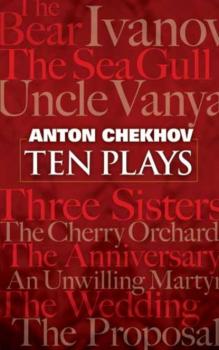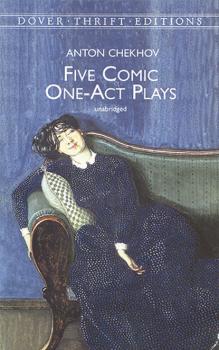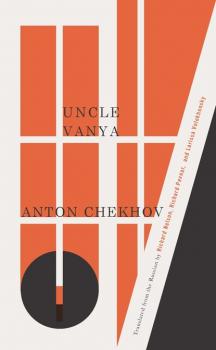Anton Chekhov
Список книг автора Anton ChekhovThe Sea-Gull
Written in 1895 and first performed in 1896, “The Sea-Gull” is widely hailed as the first of Anton Chekhov’s four most important plays. It is acclaimed for its brilliant use of subtext and remains widely studied and performed as a significant dramatic work. It is the story of the romantic and artistic conflicts between four main characters: Nina, a young, aspiring actress and the daughter of a wealthy landowner; Madame Irina Arkadina, once a great leading actress; Konstantin Treplyov, her son and a playwright; and Trigorin, Irina’s lover and a well-known writer. While Chekhov intended that the play be more comedic in tone, it is often performed and interpreted as a subtle and nuanced tragedy, full of doomed romances, frustrated artistic ambitions, loneliness, and regret. “The Sea-Gull” is frequently adapted for stage and screen and the roles of Nina, Irina, Konstantin, and Trigorin are famous for the subtle depths of emotion the parts call for. Over a century after it was first performed, “The Sea-Gull” remains a theatrical masterpiece and the work that established Chekhov’s reputation as a brilliant playwright. This edition follows the translation of Marian Fell and includes a biographical afterword.
Ten Plays
Here in one compact and modestly priced edition are the celebrated Russian playwright's most popular works. In addition to five full-length plays—The Sea Gull, Uncle Vanya, The Three Sisters, The Cherry Orchard, and Ivanov—this anthology features five of Anton Chekhov's one-act comedies: The Anniversary, An Unwilling Martyr, The Wedding, The Bear, and The Proposal.Chekhov's taste for vaudeville shows and French farces influenced his comic one-acts, which are widely regarded as masterpieces of the genre. His greatest fame rests upon his full-length tragedies, which focus on mood and characterization rather than plot. Chekhov considered his famous tragedies a form of comic satire—with the bleakness of life in czarist Russia at the turn of the twentieth century as their central joke. «All I wanted was to say honestly to people: 'Have a look at yourselves and see how bad and dreary your lives are!'» explained the playwright. In addition to their enduring emotional and intellectual appeal to audiences, Chekhov's modern realist dramas continue to influence theatrical literature and performance.
Five Comic One-Act Plays
One of the foremost dramatists of the 19th century, Russian author Anton Chekhov (1860–1904) created a body of work noted for its realistic dialogue and keen insights into human relationships. This collection of five one-act plays — in the celebrated Constance Garnett translations — shows Chekhov at his witty best.The Anniversary takes a lively look behind the frenetic scenes at a bank: a man overburdened with errands from friends and family gives a nearly maddened but ludicrous account of his chores and obligations in An Unwilling Martyr; and The Wedding depicts scenes from a wedding reception in which the mother of the bride assumes affected airs and deals with quarrelsome guests. In The Bear, a virtuous, spirited widow is pressed to repay a debt and ends up receiving an offer of marriage. The Proposal depicts the trauma of a would-be suitor who winds up in a wrangle over property.Theater lovers, students of drama and literature, and other readers, as well as amateur and professional groups performing these popular works, will welcome this convenient, inexpensive collection of comic gems by one of the masters of modern drama.
The Cherry Orchard
The Cherry Orchard was first produced by the Moscow Art Theatre on Chekhov's last birthday, January 17, 1904. Since that time it has become one of the most critically admired and performed plays in the Western world, a high comedy whose principal theme, the passing of the old semifeudal order, is symbolized in the sale of the cherry orchard owned by Madame Ranevsky.The play also functions as a magnificent showcase for Chekhov's acute observations of his characters' foibles and for quizzical ruminations on the approaching dissolution of the world of the Russian aristocracy and life as it was lived on their great country estates. While the subject and the characters of the work are, in a sense, timeless, the dramatic technique of the play was a Chekhovian innovation. In this and other plays he developed the concept of «indirect action,» in which the dramatic action takes place off stage and the significance of the play revolves around the reactions of the characters to those unseen events.Reprinted from a standard edition, this inexpensive well-made volume invites any lover of theater or great literature to enter the world of Madame Ranevsky, Anya, Gayef, Lopakhin, Firs, and the other memorable characters whose hopes, fears, loves, and general humanity are so brilliantly depicted in this landmark of world drama.
The Witch and Other Stories
IN the village of Reybuzh, just facing the church, stands a two-storeyed house with a stone foundation and an iron roof. In the lower storey the owner himself, Filip Ivanov Kashin, nicknamed Dyudya, lives with his family, and on the upper floor, where it is apt to be very hot in summer and very cold in winter, they put up government officials, merchants, or landowners, who chance to be travelling that way. Dyudya rents some bits of land, keeps a tavern on the highroad, does a trade in tar, honey, cattle, and jackdaws, and has already something like eight thousand roubles put by in the bank in the town.<br><br>His elder son, Fyodor, is head engineer in the factory, and, as the peasants say of him, he has risen so high in the world that he is quite out of reach now. Fyodor's wife, Sofya, a plain, ailing woman, lives at home at her father-in-law's. She is for ever crying, and every Sunday she goes over to the hospital for medicine. Dyudya's second son, the hunchback Alyoshka, is living at …
The Wife and Other Stories
YEVGRAF IVANOVITCH SHIRYAEV, a small farmer, whose father, a parish priest, now deceased, had received a gift of three hundred acres of land from Madame Kuvshinnikov, a general's widow, was standing in a corner before a copper washing-stand, washing his hands. As usual, his face looked anxious and ill-humoured, and his beard was uncombed.<br><br>"What weather!" he said. "It's not weather, but a curse laid upon us. It's raining again!"<br><br>He grumbled on, while his family sat waiting at table for him to have finished washing his hands before beginning dinner. Fedosya Semyonovna, his wife, his son Pyotr, a student, his eldest daughter Varvara, and three small boys, had been sitting waiting a long time. The boys—Kolka, Vanka, and Arhipka—grubby, snub-nosed little fellows with chubby faces and tousled hair that wanted cutting, moved their chairs impatiently, while their elders sat without stirring, and apparently did not care whether they ate their dinner or waited....<br><br>As though trying their patience, …
Uncle Vanya
“Spectacular…This new Vanya has a conversational smoothness that removes the cobwebs sticking to those other translations that never let you forget that the play was written in 1897… One of the most exquisite renderings of Uncle Vanya I’ve encountered.” —Charles McNulty, Los Angeles Times “Quietly arresting… A canny and colloquial world-premiere translation… A beautifully rewarding exploration of stunted lives still bending toward the meager sunlight, like wildflowers sprouting from a cracked sidewalk.” —James Hebert, San Diego Union-Tribune As the sixth play in the TCG Classic Russian Drama Series, Richard Nelson and preeminent translators of Russian literature, Richard Pevear and Larissa Volokhonsky, continue their collaboration with Chekhov’s most intimate play. Other titles in this series include: The Cherry Orchard by Anton Chekhov The Inspector by Nikolai Gogol Molière, or The Cabal of Hypocrites and Don Quixote by Mikhail Bulgakov A Month in the Country by Ivan Turgenev The Seagull by Anton Chekhov
The Cherry Orchard
Oh, the trees! Nothing but white and green as far as you can see – remember, Lyuba?Oh my lovely childhood. Waking up to happiness, looking out at blossom and trees and there they are – the same trees, the same blossom – after cruel winter, warmth and light and feeling!In his masterpiece The Cherry Orchard, Chekhov maintains an exquisite balance between elegiac celebration of the romance of the past, as embodied in the cherry orchard in full bloom, and the awesome prescience of what is so soon to overwhelm Russia – revolution. The themes are majestic, and yet at the centre of the play is Ranévskaya, a tragic woman who lacks adroitness for survival in a changing world but who has one asset: a capacity for love. It is her solution – and Chekhov's.This new version of The Cherry Orchard by Pam Gems opened at the Crucible, Sheffield in March 2007.
The Seagull
‘We need the theatre, couldn't, couldn't do without it. Could we?’ A successful actress visits her brother's isolated estate far from the city, throwing the frustrated residents unfulfilled ambitions into sharp relief. As her son attempts to impress with a self-penned play, putting much more than his pride at stake, others dream of fame, love and the ability to change their past. Chekhov's darkly comic masterpiece is reignited for the 21st century by one of the most exciting new voices in British Theatre, Anya Reiss, Winner of the Most Promising Playwright at both the Evening Standard and Critics Circle awards.
The Seagull
‘Only love brings happiness into this earth, the poetical love of youth, sweeping away the sorrows of the world.’ As guests assemble at a country house for the staging of an avant-garde open air play, artistic temperaments ignite a more entertaining drama behind the scenes, with romantic jealousies, self-doubt and the ruthless pursuit of happiness confusing lives, loves and literature. The Seagull was the first of Chekhov’s great works and is celebrated as one of the most important plays of the nineteenth century. This new version, commissioned by Regent’s Park Open Air Theatre, marks the play’s 120th anniversary.









